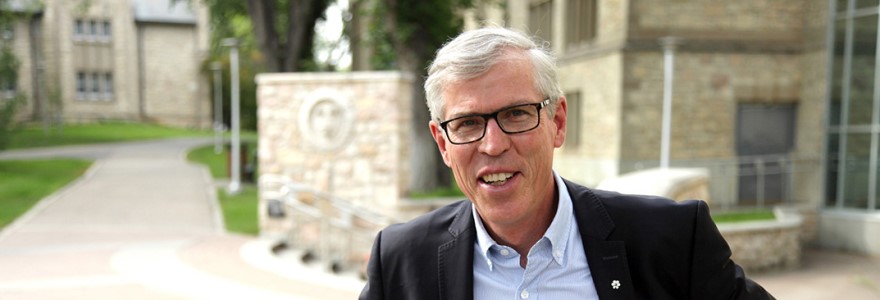News and Updates
Contact
Faculty of Social Science
Social Science Centre
Room 9438
Western University
T. 519-661-2053
F. 519-661-3868
E. social-science@uwo.ca
The Goodman Lectures: Telling the story of Almighty Voice
November 03, 2021
Story by Rob Rombouts/Photo from University of Saskatchewan
“In the 1890s, the name of Almighty Voice was on people’s lips,” said Bill Waiser. Yet, now Almighty Voice is largely unknown.
Almighty Voice, a member of the One Arrow Willow Cree, was killed by the North West Mounted Police in 1897. His story, says Waiser, is a way to explore the history and state of Indigenous/non-Indigenous relations and reconciliation. On November 16 to 18, Waiser will examine the life and death of Almighty Voice, for the 2021 Joanne Goodman Lectures in the Department of History. Waiser, a western Canadian historian, has published 19 books, is a frequent public speaker and media contributor, and a member of the Order of Canada.
On November 16, ‘The White Man Governs’ will look at the history of Indigenous relations from 1876 to the immediate post-1885 rebellion time.
Through the 1870s, the “numbered treaties” were signed between Indigenous nations and the Canadian government. These treaties defined the relationship between Indigenous people and non-Indigenous people but were challenged by Indian Affairs practices and policies.
After the 1885 North West Rebellion, the Department of Indian Affairs adopted a heavy-handed attitude toward First Nations people on the prairies and the lives of Indigenous peoples were severely restricted. Indigenous peoples could not leave reserves without permission, could not practice their traditional beliefs, had to get a permit to sell agricultural goods, and were expected to operate as peasant farmers, using hand tools, and could not purchase modern farming equipment.
One Catholic bishop suggested that First Nations regarded reserve life as a form of “slavery.”
The Canadian government promoted white settlement in the 1890s, and worked to keep white settlers and Indigenous people apart. Through these actions, Waiser said, the Canadian government and white settlers turned their back on treaty agreements.
“Even though we are treaty partners, even though it was meant to be a long-term reciprocal relationship, the attitude was to keep the people apart,” he said.
On November 17, “The Outlaw Indian” will tell the story of Almighty Voice.
In 1895, Almighty Voice, facing lack of food and a terrible situation for his family and community, killed a stray cow as a source for food. Almighty Voice was arrested, but he escaped and killed an officer of the North West Mounted Police. In 1897, the NWMP confronted Almighty Voice, and three more government agents were killed. The mounted police used a cannon to shell his hiding place in a bluff and killed Almighty Voice and two companions.
“This was one of the most documented criminal records in the North West Mounted Police history,” said Waiser, “but you have to read the documents differently and understand the biases toward First Nations People.”
On November 18, “The Road to Truth and Reconciliation”, will look at how that story has been told over the decades, and what it says about the reconciliation effort today.
When discussing the story of Almighty Voice, Waiser said it is important to “recognize some hard truths” and think about why Almighty Voice resisted.
“We have to use this historical knowledge to deal with and grapple the challenges we face today,” said Waiser. “Almighty Voice is one individual, but he is representative of how First Nations people were dealt with a century ago.”
In 2020, Waiser published In Search of Almighty Voice: Resistance and Reconciliation. He worked closely with Tricia Sutherland, Chief of the One Arrow First Nation, and was invited to launch the book at a Pow Wow at the One Arrow Community, at the request of One Arrow elders.
When working on reconciliation, “we have to stop telling First Nation people how to behave, and how to think. We have to sit down and have a conversation,” Waiser said. “It will be painful and hard. I know some non-Indigenous people will get angry because of the things they will hear, but we have to talk to each other, and not just talk at each other.”
It is also important to remember that we are still treaty people.
“The treaties talked about a long-term reciprocal relationship where treaties were constantly renewed,” said Waiser. “We have forgotten about the renewal.”
The Joanne Goodman lectures were established in 1975 by the Honourable Edwin A. Goodman and his family of Toronto to perpetuate the memory of their beloved elder daughter, a second year History student who died in a highway accident in April of that year. Since 1976 the series has been jointly sponsored by the Department of History and the University Students' Council.
The lectures are widely recognized as being the most important history lecture series in Canada. The invitation to deliver them and the publications that result are highly regarded in this country and around the world.
The Joanne Goodman Lectures will be available via live stream on November 16-18. Registration is required.

